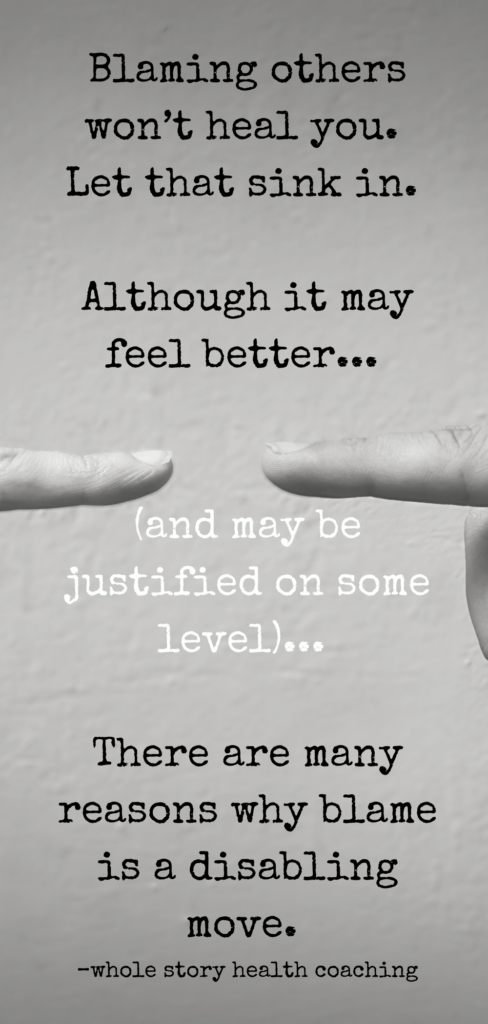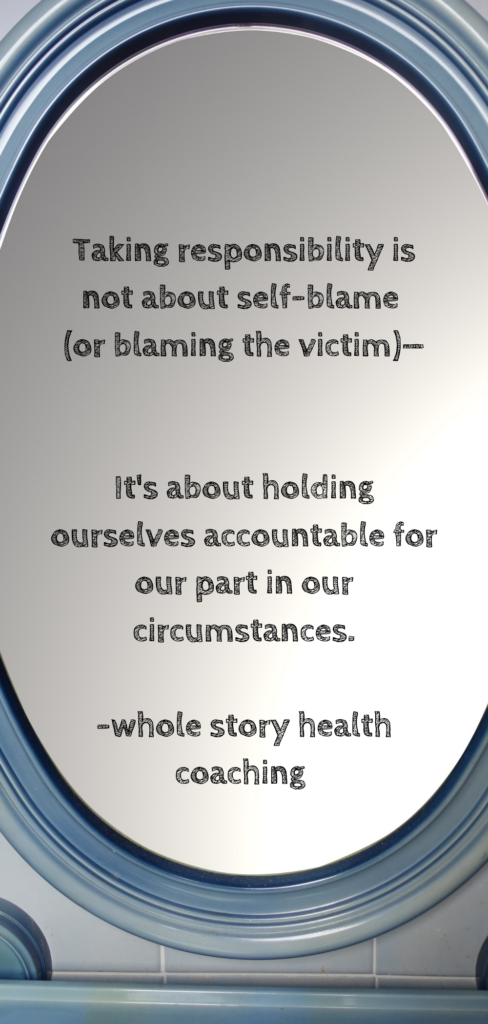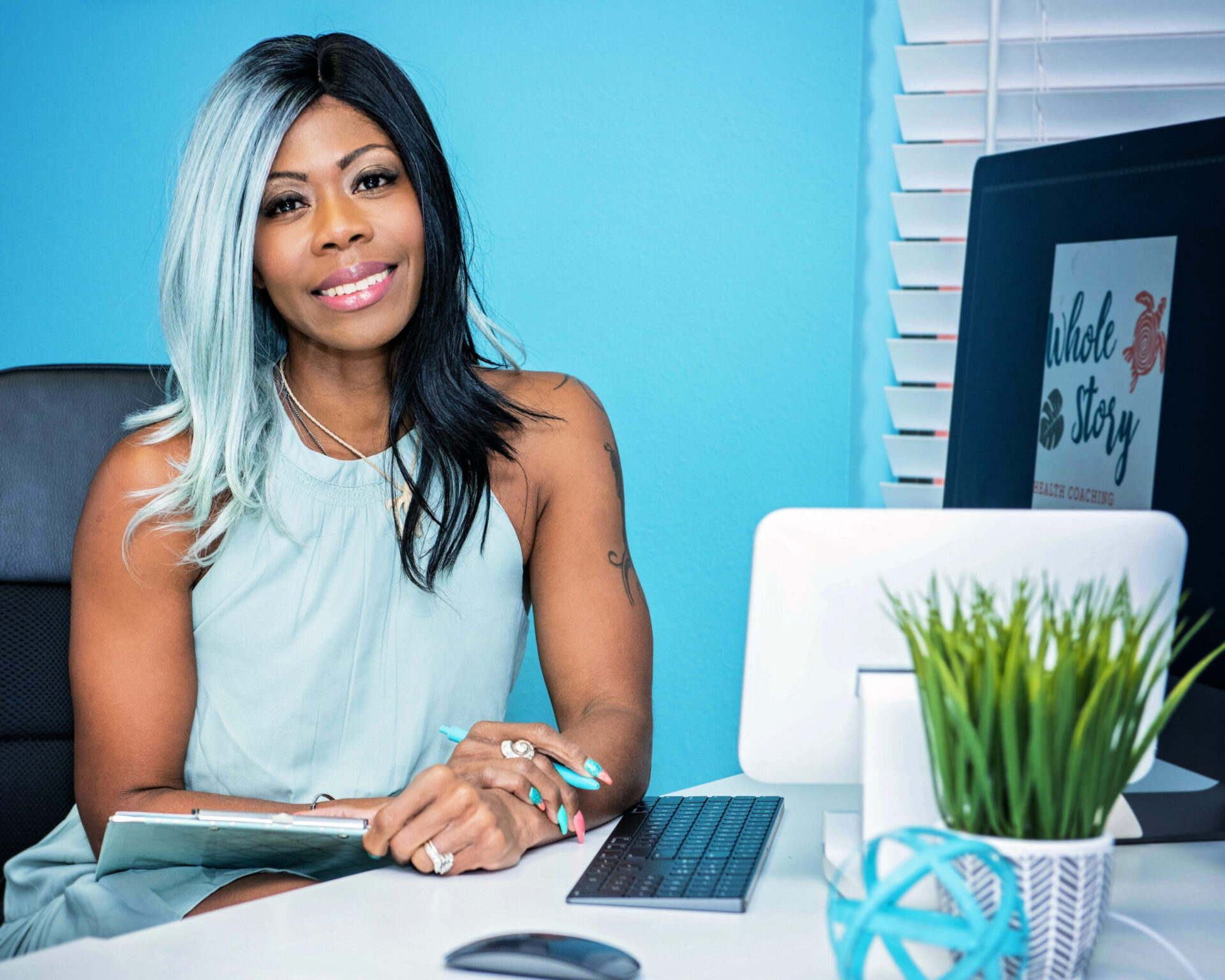We all do it at some point. Finding fault and blaming are a part of being human. In some cases, blame can become a form of self-protection. Unfortunately, it can also become a mental prison.
When we are hurting, it is human nature to focus on a cause outside of ourselves. The problem is that blaming leaves us unaware of our contribution to what we are going through— and we can’t heal what we don’t know is wounded.
Although it may feel better (and may seem justified on some level), there are many reasons why blaming others is a disabling move. Blame:
- places us in the role of victim
- renders us helpless
- disempowers
- gives unnecessary control to circumstances outside of us
- takes away our perception of having choices
- causes us to believe that we have no say so in our own lives
- won’t heal our wounds
Let that list sink in.
The inability to see ourselves with clarity stops us from understanding our own patterns, behaviors, habits, and thought processes—vital information that we can use to make better choices in the future.

Blaming Versus Taking Responsibility
Make no mistake, taking responsibility is not about self-blame (or blaming the victim)—it’s about holding ourselves accountable for our part in our circumstances.
Learning to be accountable gives us the power to take charge of our fate. When we allow ourselves to do this, we improve our chances of participating in a healthier relationship with ourselves and others.
By recognizing our own tendencies, we can stop the cycle of repetitive toxic and destructive behaviors. We empower ourselves.
Taking a Closer Look
At some point, we must be able to look at our own choices—and why we keep making the same mistakes over and over.
Recognizing our patterns and interrupting them is key. It is not a passive process. It will take time, effort, resilience, and patience on our part.
Keep the following five areas in mind when you start to notice destructive and repetitive situations.

#1. Blame Vs. Responsibility
One common phrase that I hear quite often is, “He/she made me (fill in the blank).” No one and nothing can make us do anything. We choose to react in a way that brings us what we feel is a benefit in that moment.
The truth is, we have a choice in how we react to people and circumstances. When we are aware of our triggers and difficulties with maintaining self-control, it is up to us to make the necessary adjustments. We must take the time to do the inner work to better ourselves.
#2. Blinds Us to Our Choices
Choosing to stay where we are unwanted or mistreated is a tough one for most to admit. While there may be legitimate reasons, it is important that we ask ourselves the right questions. Are we:
- sure we don’t have anywhere else to go?
- making strides towards our mental and emotional security?
- taking the necessary steps to take charge of our independence?
- convinced that things will never get better and so we give up?
- admitting that this is what we are willing to accept for the foreseeable future?
#3. Circumstances
When we find ourselves in a toxic relationship and feel tempted to blame the person inflicting damage, we need to take a step back and ask how we ended up in these circumstances. Is it the first time? Where were we mentally and emotionally that led us down this particular path?
#4. Allowances
It’s easy to focus on what people are doing to us, but we are responsible for choosing that person and allowing them close enough to affect us. That’s a hard pill to swallow.
- Is it really their fault that we allowed it?
- Or that we continue to endure it?
- What about allowing our boundaries to be violated?
- Who is responsible when we don’t put non-negotiables and dealbreakers in place?
Those are the tough questions that we have to be able to ask ourselves —before we start assigning blame.
#5. Creates Imbalanced Dynamics
I , like many others, have experienced dysfunctional dynamics in both my friendships and relationships. In the past, I have spent a lot of time on the losing end.
Usually, I found myself in the role of people pleaser and even rescuer/caretaker. Because I wanted so desperately to be liked and accepted (while avoiding rejection), I only added fuel to the fire.
My insecurity and inability to recognize my worth laid the foundation for the dysfunctional dynamics and circumstances I found myself in. We can expect these imbalances when we:
- lack a strong sense of self
- don’t have strong boundaries
- have wavering standards
Blame keeps us stuck, that much is clear. Once we stop the process, and strive toward growth and healing, we empower ourselves.
By allowing ourselves to take responsibility, we also get the option to take control.


